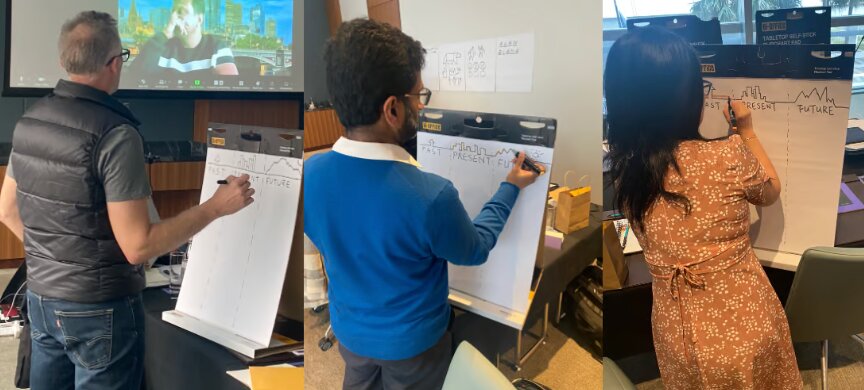What's his special sauce?
While his team are focused on warrants, facts, evidence and legal rights, as a 'not police officer', Castle is a little more playful with his involvement in the crime solving.
He creates stories.
What I noticed after watching 3 seasons of the show was that while the team were in the detail, combing the evidence and interrogating the suspects, Castle was able to sit back and open his mind. To think about the 'what ifs?' and 'what abouts?'.
Of course this is fiction, but what I realised was happening was this:
The technicians get in the detail, but the stories create colour. The stories are what provides the 'aha' moments and the breakthroughs because they consider the emotion behind the evidence and the environment surrounding the people involved.
It reminded me of some work I'd been doing with one of my extraordinary CFOs. We'd just come off the back of a successful Strategic Planning weekend with her Board and she was now fleshing out the story behind the work done over the weekend. The first time we tried it was late in the afternoon, on a day she'd had back to back meetings trying to get transactions over the line, deal with auditors and staff issues. Standard stuff for a CFO.
What gets in the way of storytelling for CFOs
We got to our meeting and I tried to coach her through the storytelling. She was stuck. She kept saying 'but what can I say that's not already written on the page'. Her head simply wasn't in the space to create the story.
While time (or more specifically, lack of) is a common roadblock as articulated by CFOs, it's a lack of space that actually holds CFOs back. Not being able to lean back slowly and give the brain the freedom to wonder and wander, putting together all the millions of pieces of data collected during the course of the weeks.
What you need if you're a CFO that needs to improve their storytelling
1. Space: winning the week is a big component of the success of our CFOs in the CFO Boardroom. They do this by planning their year, their quarter and their weeks. But it's not just planning for prioritisation and time management purposes. It's about knowing their energetic flows and what 'space' they need to execute on the most important tasks. Fun fact: Space doesn't always have to equate to 'lots of time'. In fact, our Monday Momentum session is a punchy 20 minutes where we give our courage CFOs the space to think strategically, look at the big picture and identify and plan the 3 most important tasks of the week. It gives them the winning edge!
2. Strategy: a story needs a context, and in a business environment the strategy or strategic plan is that context. So you need to know how the story sits in the strategy and if you struggle to figure that out - that's a sure sign that you need to do more work before you present your work more broadly. Important note: you need to know whether the people you're telling the story to are aware of and ideally bought into the strategy. If they're not, part of your storytelling will need to include anchoring 'your' story into the context of the strategy (which will encompass industry and market context).
3. Specifics: this is something CFOs have in spades. This is where you can bring in the data, numbers and details into the story. The specifics anchor the story in reality and allows the work to be measured, monitored and managed accordingly. Get the edge: create a compelling visual to go with your story. As we experienced in our last 'In the Boardroom' mastermind, this is far more simple when taught some key basics and if you can facilitate this while you tell the story, you will provide some truly 'surprise and delight' moments for your business.
Just like the detectives and police officers in Castle, most CFOs will skip straight to specifics. But it's in the story where the magic happens.
Indeed, my client created some incredible magic in her subsequent Board meeting, where she shared the 5 year story with her Board. She said the feedback from her Board was one of implicit trust and continued inspiration from the Strategic Planning weekend and they were excited to continue to support her, the CEO and the executive team in delivering the strategy. She nailed it!
How do you use storytelling as a leadership tool?
Do you have the space to create, practice and share impactful stories?
What might be the impact on your team, your business and the community you serve if you were better at storytelling?


